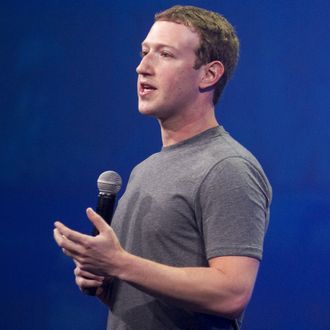
Over the last year, Facebook has been confronted with an unprecedented and unforgiving wave of criticism. While there are many specific complaints that have been made about the company — its relationship with “fake news” (of both the genuinely fake and the merely misleading varieties), its mishandled “Trending” topics, and its role in perpetuating informational-filter bubbles, to name the most prominent — the criticism of the last several months hinges largely on this: Facebook has become one of the two most powerful networks on the planet for the distribution of news and information. And while founder and CEO Mark Zuckerberg has expressed skepticism over Facebook’s role in last year’s presidential election, he’s clearly taken the criticism seriously. He just wrote a 5,800-word Facebook post, updating the company’s mission and pointing toward its future. It sounds, frankly, like Zuck would like a do-over.
Zuckerberg’s globalist pledge went live yesterday afternoon, along with a coordinated media blitz: The generally press-shy CEO gave four interviews to prominent technology-business publications, emphasizing the document’s embrace of an interconnected world. (The best is with Recode’s Kara Swisher: “Mark Zuckerberg … has become of late very, how shall we put it, woke.”) To the casual observers who’ve been predicting a Zuckerberg run for office, the whole event felt like further confirmation. But after reading the document, my sense is that Mark Zuckerberg isn’t setting himself up for a political career, but is finally dragging himself across the finish line of self-realization. Zuckerberg — always, as Swisher puts it, “the most earnest of leaders in Silicon Valley” — has spent some time thinking very hard about his creation, and he wants you to know that he understands Facebook’s immense power, and that he will use it to create a better future. Put another way: This isn’t a campaign speech; it’s an inauguration speech.
He writes:
Our greatest opportunities are now global — like spreading prosperity and freedom, promoting peace and understanding, lifting people out of poverty, and accelerating science. Our greatest challenges also need global responses — like ending terrorism, fighting climate change, and preventing pandemics. Progress now requires humanity coming together not just as cities or nations, but also as a global community.
Zuckerberg wants to position Facebook, a publicly traded nongovernment company, as the global communication layer under which everything else rests. It’s a not-very-subtle way of making the case to give Facebook an even larger amount of influence than it already wields, but, you know, for the greater good.
Today’s threats are increasingly global, but the infrastructure to protect us is not. Problems like terrorism, natural disasters, disease, refugee crises, and climate change need coordinated responses from a worldwide vantage point. No nation can solve them alone. A virus in one nation can quickly spread to others. A conflict in one country can create a refugee crisis across continents. Pollution in one place can affect the environment around the world. Humanity’s current systems are insufficient to address these issues.
But realization is only the first step. Zuckerberg definitely seems to believe what he’s saying about building a global community, but there’s little concrete in here about how it would be accomplished — or, more importantly, how it will affect Facebook’s business model and bottom line, which is still the driving force behind … everything they do. Facebook attempted a disastrous rollout of its “Free Basics” internet-service program in India a couple of years ago, and was quickly met with backlash over monopolistic practices. Now, that same basic pitch is being applied to the entire world. Among the specific initiatives Zuck proposes is using artificial intelligence to identify and hide misleading or objectionable content, more public-service features like Safety Check, and, uh, making Groups into a more useful product.
The manifesto contains one important admission from Zuckerberg (Facebook is vastly influential), but lacks a corresponding truth (that power is what makes people skeptical of Facebook). In fact, what Zuckerberg has done is provide an inadvertent argument for the decentralization of the internet — small groups and communities with the ability to access a larger global network when necessary. The idea of a global communication network is very popular already: It’s called the internet. The manifesto reads like Mark Zuckerberg has never encountered an email client or a LISTSERV. That network grew and thrived thanks to the proliferation of open standards, like email and web protocols. Facebook, conversely, is a technological black box whose breakthroughs exist to enrich itself, first and foremost. If Mark Zuckerberg truly cares about global communication, he might want to think about putting more of the company’s tremendous resources toward developing the types of open standards that can exist outside of Facebook.
It is fun that Zuckerberg has finally realized how much power Facebook truly has to shape people’s understanding of current events, while he continues to keep initial investor, Trump adviser, and Gawker lawsuit funder Peter Thiel on the board. Zuckerberg’s manifesto is a nice idea (and a so-so piece of writing). But Facebook has made many claims to care about its users in the past, and then acted to the contrary or not acted at all.





























